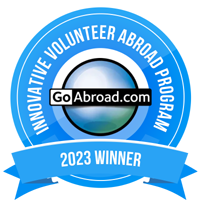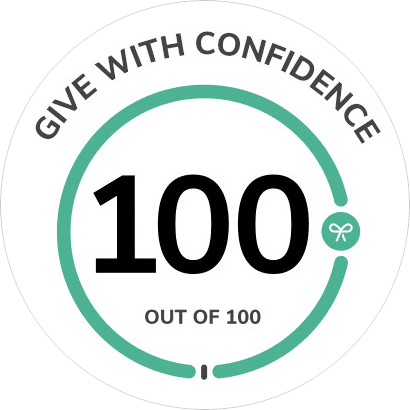
Arlyn in her classroom!
While on sabbatical from teaching, Arlyn volunteered in Nepal. She is thrilled she had the opportunity and tells more of her story below.
Meet Arlyn, a seasoned teaching professional who went on a Volunteer Abroad Quest through United Planet in 2011. Arlyn is no stranger to traveling and has been fortunate to have visited many countries during her career.
“I’m a very service-oriented person and I’d been thinking about doing a volunteer service trip for some time. With a lifelong interest in education around the world, the opportunity to teach English in Nepal was thrilling. When this opportunity came up, I jumped at the chance.”

Happy students playing outside the school
Packed and ready to go, she set off on her adventure. Arlyn’s initial impressions of Nepal were through the plane’s window as she stared wide-eyed at the some of the highest peaks in the world. Once on the ground, she marveled at the colorful clothing of the people she saw, was tickled to see monkeys wandering here and there, and amazed by the massive traffic congestion on the streets.
Cars, motor scooters, trucks and tractors lugging cargo all fought for space on narrow, one way roads often no wider than alleys.
The constant honking, gridlock and pollution was a shock to someone who thought she had seen chaotic roads in other countries. On her first day in Nepal’s capital city of Kathmandu, she was eager to begin her adventure but anxiously wondered what everything would be like. Would she like her home stay? Would the food upset her stomach? What would teaching really be like? As she finally got settled into her home stay, she found she was able to relax and enjoy the beautiful moments of Nepal each day.
“Teaching for 6 days in Kathmandu was a wonderfully rewarding experience,” said Arlyn, “although it certainly had its challenges. Education is happening there; it’s just not built out to the capacity one would hope.”
The school, where Arlyn taught, was founded by a local visionary named Uttam Sanjel, who is working hard to provide a decent, affordable education to poverty-stricken children throughout Nepal. Because she arrived in Nepal as a seasoned traveler, she wasn’t as shocked by what she saw yet was still saddened by the poverty, pollution and lack of basic supplies available at the school.
The school rooms were filled with many benches on dirt floors. They were positioned in front of long, thin tables illuminated only by the light coming in through the lattice and spaces between bamboo walls. A few light bulbs hung strategically to illuminate the darkest corners. A blackboard, eraser and small pieces of chalk were all that functioned as teaching materials. Some content-area books did exist, yet they weren’t culturally relevant and often contained vocabulary that was too advanced for the students. On the narrow benches sat forty-five to sixty-seven uniform-clad students crammed so closely together there was hardly room to stand – as is customary- when called on to speak. Because of the sheer number of students in one room, it was very difficult for teachers to learn everyone’s names – thus they sometimes resorted to calling out numbers to identify them.
A typical interaction between student and teacher went something like ‘Student #42, what did you have for an answer to this homework question?’ The school was not able to supply typical items such as papers and pencils, computers or photo copiers. No gym or cafeteria, no rooms other than the school rooms themselves. There was no running water, other than a tap at the school’s entrance. Students had to bring their own pens and sometimes had to share. If one ran dry or broke, it became very stressful for the kids. Basic supplies are clearly a valued commodity and not easily replaceable.
“I thought about all the extra pens I have laying around my house and I couldn’t believe I didn’t bring a whole bag of them” she said while recalling the poverty stricken country. Despite the difficult conditions, her students were so eager to learn and happy to come to school every day. The children rejoiced as they were taught songs such as “You are my sunshine” and the “Hokey Pokey.”
They were enthusiastic and immensely grateful for everything Arlyn taught during her forty-five minute classes. When asked if they wanted to learn about American holidays, they enthusiastically shouted “Yes”! The myriad of questions they asked about America both warmed Arlyn’s heart and saddened her, knowing they have so little access to the wider world.

Students working hard in class
It did take some time for Arlyn to get used to certain aspects of life at the school. For example, when everyone in the modest teacher’s room was finished eating lunch, they would throw their garbage in a corner on the floor, rather than use a wastebasket.
At the end of the day someone would come and clean it up, leaving a litter-free floor the next day. While this was an odd, foreign practice to Arlyn, she knew littering was very normal for the Nepalese people. She also mentioned the standard fare students ate for lunch included dry ramen noodles, and if they were among the lucky,their parents would bring them hot pails of food.
When the weather was nice, children would eat outside and then play together in the bare, open space. There were no aspects typical to a western playground such as slides or swings, just dirt and open air. Yet knowing no differently, the children still found joy in the simple art of play.
When asked what biggest teaching challenge Arlyn faced at the volunteer project site, she replied the noise level made teaching and learning incredibly difficult. Not only did she have to strain to hear individual students as they spoke, but the thin bamboo walls allowed her to hear neighboring classes loud and clear, along with children playing outside and the typical pattern of low-flying planes overhead. Trying to focus on one noise at a time proved difficult and frustrating. Speaking loudly enough for students to hear left Arlyn with a tired, raspy voice by day’s end. Needless to say, this was quite a different educational experience than in America.

Hindu temple in Kathmandu
It wasn’t all hard work, though. During her time in Nepal, Arlyn was able to take advantage of several cultural excursions and time off. She saw Mount Everest, visited an organic farm, explored local shops, and enjoyed walks through neighborhoods, observing Nepalese people in their daily life.
One highlight was her visit to the biggest Hindu temple in Kathmandu. She felt deeply moved when she had the opportunity to observe the sacred ritual of cremation over funeral pyres at the Ganges River. “I was breathless, struck by the life that was over and the ritual that has sustained itself for millennia” she said.
Arlyn felt lucky that she was able to return to a nice family in a comfortable home each evening. Her home stay family lived in a house with running water and western toilets, for which she was grateful. She found the family very accommodating and they even offered Arlyn the first floor where they slept, so she wouldn’t have to travel up and down the stairs to her guest room.
She was also able to get to know the family’s children and extended family. Typical to many Nepalese households, the extended family lived together, separated by different floors. Brothers, sisters and grandparents all shared the house, living peacefully among bells, prayer and the thick smell of incense. There were some adjustments however.
“I never had a hot shower while I was there, and the electricity was frequently cut off for hours at a time, but I adapted” said Arlyn. Overall, she was very happy with her home-stay placement and understood the reality that her daily life in Nepal would look very different than in America.

Young Nepalese child
Arlyn’s biggest accomplishment while in Nepal? Because the tiny, under-stocked library at the school wasn’t open to students, she suggested that the teacher assign each child a trip to the local library at least once per month.
“I hope the teacher follows through – a library can open the world to them.”
Arlyn only spent 6 days teaching, but feels she gained just as much as she gave. The trip of a lifetime she called it, that everyone should have the opportunity to take.
Arlyn supported both United Planet and Belmont World Film when she won the Nepal Quest at a silent auction to benefit the film society. United Planet has been delighted to support Belmont World Film in their efforts to promote cross-cultural understanding and share world culture.
ABOUT UNITED PLANET
United Planet is a non-profit organization with a mission to create a global community, one relationship at a time. Established in 2001, United Planet offers volunteer abroad, virtual internships, internships abroad, gap year volunteering, and global virtual exchange in more than 40 countries.




